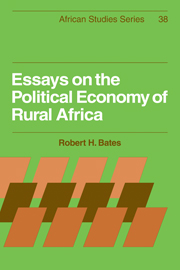Introduction
Published online by Cambridge University Press: 26 January 2010
Summary
Rural Africa is important in its own right. For scholars, it is important as well in that it poses problems which offer opportunities for intellectual progress.
Until recently, most observers behaved as if the urban and industrial areas were determining the fundamental character of the African continent. For some, the cities embodied and instilled new cultural values. For others, they propagated new forms of social organization. And, for most, the urban and industrial sectors contained the forces of change; the rural areas, the forces of inertia. Certainly, for political scientists, the cities represented the critical political arena; for it was in the towns of Africa that political movements were organized, voters mobilized, riots fomented, and coups set in motion.
Despite the rapid growth of the towns and the concomitant growth in expectations of rapid social change, the vast preponderance of Africa's population has remained in the rural areas. And, despite massive investments in industry and manufacturing, the vast bulk of Africa's economy has remained in agriculture. The agrarian population of Africa has, from time to time, won the attention it thus warrants; but such recognition has most generally come at moments of high drama, such as times of drought or of triumph by rural liberation movements.
Increasingly, however, less dramatic but more powerful forces have begun to compel a reassessment of the importance of rural Africa. Most fundamentally, a recognition has grown that the limits to Africa's capacity to undergo social change are determined in large part by the performance of its rural sector.
- Type
- Chapter
- Information
- Essays on the Political Economy of Rural Africa , pp. 1 - 4Publisher: Cambridge University PressPrint publication year: 1983

